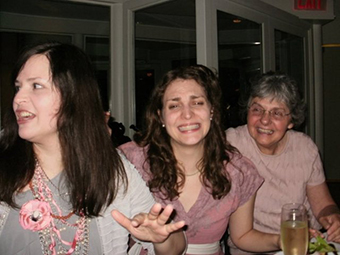Kindness and cancer: How you can help
Permanent link All Posts
Doubtless you’ve noticed all the pink already: National Breast Cancer Awareness Month is here. People of Ashkenazi Jewish descent with a family history of cancer need to know about BRCA and hereditary cancer syndromes. I’ve written about these issues for Oy! before, and I hope the articles still prove helpful:
• Do your genes belong to you?: BRCA, Myriad Genetics and the legality of patenting genes
• The Unfunniest Thing in the World: Gilda Radner and ovarian cancer
• More than pink and teal: Knowledge versus awareness
Today I want to talk about something less abstract: how you can help people with cancer and their loved ones.
Around the High Holidays in 2007, my mom began having headaches and needing frequent naps. I was a year out of college, and had just moved back to Chicago in the spring. In March 2008 she had a seizure, and we found out that she had brain tumors—glioblastomas, a particularly aggressive kind of cancer that Ted Kennedy also had. Very shortly after, she had surgery, radiation and chemo. She was part of a clinical trial at Ohio State University for a treatment that was exploring the use of modified viruses to kill any cancer cells left behind.
For three years we were very lucky, and she made an amazing recovery. In the spring of 2011, however, the tumors came back, and they didn’t let up. After exhausting all her options, in May my mom decided to stop treatment. She died on August 24.
We lived with cancer hanging over us for five years. Our friends, our neighbors, our family and our colleagues were incredibly kind. People I hadn’t heard from since childhood came out of the woodwork for us. It was and continues to be a great comfort to me and my family, because the things cancer does to a person are hideous beyond belief, and we needed all the help we could get.
One thing you hear a lot when you’re in this situation is “Please let me know if there’s anything I can do.” I know that when I’ve said it to others, it’s out of a genuine desire to be useful, but not really knowing how, or not wanting to intrude. It’s hard to gauge how any given day is going to go when you’re dealing with cancer or treatment, or when you’re a caretaker, or when you’re grieving, and in any of these situations you may simply be unable to ask for help.
What we found easiest was when someone contacted us with specifics: “I’m going to be in the area this afternoon and wanted to know if I could stop in for a visit.” “Can we come up on Tuesday and weed your garden?” “Can I give you a ride to and from the airport?” Every situation is different, of course, and it’s always good to gauge the other person’s energy or ability to have visitors. Sometimes someone would come and my mom would only be able to see them for a few minutes. The best thing you can do is to be easygoing and understanding.
That’s not always as simple as it sounds. My mom bitterly resented her loss of independence, and I never knew, from visit to visit, what she would be able to do. Managing expectations is not pleasant for anybody, but at the same time, when I look back, I think that given what we were all capable of, my mom and I got the most out of the time we had left together.
Apparently May is National Brain Tumor Awareness Month. As far as I know, it’s not color-coded. Cancer awareness in itself is not something I want to appear cynical about. It’s important to raise money for research and to talk about knowing symptoms and to feel connected with a community. One hope I cling to is that by her participation in this clinical trial, my mom may be able to help someone else with glioblastomas in the future. But I have not often seen these awareness movements address the day-to-day of coping with grief and supporting those who live with cancer. We have to have that conversation: that’s cancer education too.
I can’t speak to any personal experience of facing cancer. I can’t really speak to being a caretaker either; my dad did that heavy lifting, and there’s little heavier in the world. Others like them have shared their experiences, and we should seek out and honor them by listening. But I want to say one more thing, as someone whose mother has died, and that’s to express thanks to everyone who has offered comfort and cooked dinners and written letters and told stories. Grief is messy, and it comes out in messy ways. For me, it seems to stop up my words, or my ability to do things like return a phone call or respond to an email or a card. If you’re reaching out to someone, and it feels like all you’re getting is radio silence, please don’t be discouraged. At any of these stages, for anyone affected by this disease, what we value—what we are grateful for—is that you stick by us, and keep coming back.



.jpg)



